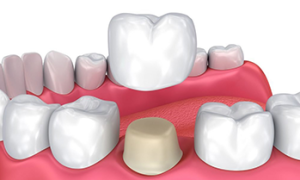5 Signs You May Need a Dental Crown and Why It’s Important to Act Quickly
A dental crown is a versatile and durable solution used to restore damaged or weakened teeth. If you’re experiencing discomfort or changes in your teeth, it might be time to consider getting a crown. In this blog, we’ll discuss the top 5 signs that indicate you may need a dental crown and why acting quickly is crucial for preserving your oral health.


1. Cracked or Chipped Tooth
One of the most common reasons for needing a dental crown is a cracked or chipped tooth. Teeth can become damaged due to various reasons, including accidents, chewing on hard foods, or grinding your teeth at night. While small cracks may not immediately cause pain, they can worsen over time, leading to further damage or infection.
Why You Should Act Quickly:
If left untreated, a cracked or chipped tooth can continue to weaken, possibly leading to the tooth breaking entirely or becoming infected. A crown can protect the tooth and prevent the crack from spreading, preserving the tooth’s function and appearance.
2. Severe Tooth Decay
Tooth decay is a leading cause of tooth loss, but a dental crown can often save a tooth that has been severely affected by cavities. If a large portion of your tooth has decayed and a filling isn’t sufficient to restore its strength, a crown may be necessary to protect and cover the remaining tooth structure.
Why You Should Act Quickly:
Delaying treatment for severe decay can result in the infection spreading to the root, requiring a root canal or even leading to tooth loss. A dental crown restores the tooth’s functionality and prevents further damage, saving you from more invasive and expensive procedures.
3. Sensitive Teeth That Won’t Go Away
Do you experience persistent tooth sensitivity, especially when eating hot or cold foods? If the sensitivity is localized to a particular tooth and does not improve over time, it could be a sign of underlying damage, such as a crack or deep cavity that is compromising the tooth.
Why You Should Act Quickly:
Ongoing sensitivity can indicate that the tooth is at risk of further harm. If the issue is not addressed, the sensitivity could worsen, and the tooth could become infected or fractured. A dental crown can cover the tooth, alleviating discomfort and restoring its integrity.
4. Large Fillings or Root Canals
If you have a large filling in a tooth or have undergone a root canal procedure, the tooth may be more vulnerable to damage or breakage. In these cases, a dental crown can strengthen the tooth and restore its shape and function. Root canals, in particular, can leave a tooth brittle and prone to fracture, making a crown an important solution for long-term protection.
Why You Should Act Quickly:
When a tooth with a large filling or root canal begins to feel loose or uncomfortable, it’s essential to get a crown as soon as possible. Without proper protection, the tooth could crack, or the filling may fail, leading to the need for more complex treatments, such as tooth extraction.
5. Discolored or Misshapen Tooth
Sometimes, dental crowns are not only used for functional purposes but also for aesthetic reasons. If you have a tooth that is severely discolored, misshapen, or uneven, a crown can help restore its natural appearance. Crowns are often made of porcelain, which closely mimics the look of natural teeth, making them a great solution for improving both the appearance and strength of the tooth.
Why You Should Act Quickly:
While cosmetic issues like discoloration or shape may not cause pain, leaving them untreated can affect your self-esteem and confidence. Additionally, discolored teeth may be a sign of deeper dental issues that should be addressed to prevent further complications.
Why It’s Important to Act Quickly
Delaying treatment for any of the signs mentioned above can lead to more serious complications, such as:
- Infection: An untreated crack or decay can lead to bacterial infection, which can spread to the root and surrounding tissues.
- Tooth Loss: Ignoring damage or decay can weaken the tooth to the point where it can no longer be saved, resulting in the need for extraction.
- Increased Treatment Costs: The longer you wait, the more complex and expensive the treatment may become. A simple crown procedure can prevent the need for a root canal, extraction, or implants down the road.
A dental crown is a cost-effective, long-term solution that restores the function and appearance of your teeth. If you notice any of these signs, don’t hesitate to visit your dentist. The sooner you act, the better your chances of preserving your natural tooth and avoiding more invasive procedures.
Conclusion
A dental crown can be a game-changer when it comes to protecting and restoring a damaged tooth. Whether your tooth is cracked, decayed, or in need of cosmetic enhancement, crowns offer a lasting solution. If you’re experiencing any of the signs listed above, it’s essential to consult with your dentist as soon as possible to prevent further damage and ensure the best possible outcome for your oral health. Don’t wait acting quickly can save your tooth and keep your smile bright for years to come!


